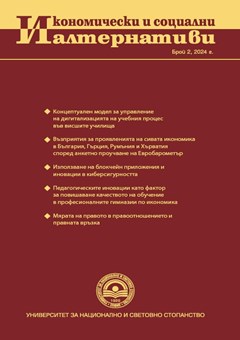How Long Shall Man be the Measure of All Things? Artificial Intelligence Systems and the Protection of Human Rights: Overwhelming Risks or Beneficial Opportunities?
Author: Diana Kovatcheva
Abstract
Artificial intelligence systems are gaining an increasingly significant place in contemporary life and affect human lives and economic development in a remarkable and irreversible way. However we should be alert about the risks robots might bring to the enjoyment of human rights. The dangers are related to the neglect, violation and sometimes exclusion of a number of rights that are of decisive importance for the well-being and security of every person. Such violations can lead to discrimination, inequality and social exclusion. The deficiencies in the understanding of the value of fundamental rights in self-learning robots is a fact we should be aware of. Nowadays intelligent machines are still just a tool for improving people’s lives. And yet as far as the protectiоn of human rights is concerned, the dynamic self-improvement and upgrading of artificial intelligence systems require human supervision and “ethical oversight”. Within this context it is important to develop algorithms for the protection of human rights that robots cannot modify even in their self-learning process. Rules should be legally established and unified, so that АI systems can only upgrade themselves in a human-preset direction. Otherwise they can develop in an unexpected way and affect common human values and achievements. Such rules should grant particular protection to people in a vulnerable position - the disabled, the children, the elderly and the sick, the poor and in certain cases - women. The study explores issues related to the impact of increasingly used intelligent systems on the economic, social, civil and political rights. Some of the most affected rights are the right to labour, a number of social rights, the freedom of movement, freedom of expression, the right to a fair trial and the protection of personal data. These rights should be protected and guaranteed through legislation at the international and national level, as well as through the consistent practice of the institutions.

